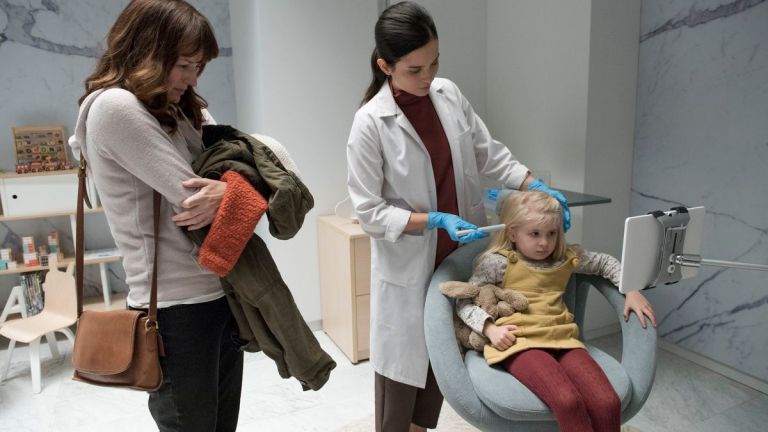Black Mirror season 4: Arkangel review
Directed by Jodie Foster, Arkangel is a thought-provoking tale about where to draw the line when protecting children from harm. Spoilers…

This review contains spoilers.
4.2 Arkangel
Jodie Foster’s first directing gig was on George Romero’s creepy anthology TV show Tales From The Darkside. In 1988, she directed Do Not Open This Box, a sort of revisited version of the old Brothers Grimm tale The Fisherman and his Wife about an avaricious woman who abuses a supernatural gift, and her long-suffering husband. It was a morality story warning against greed and urging viewers to be careful what they wish for.
Almost thirty years later, Foster has come full circle with Black Mirror episode Arkangel. Here, once again, she directs an instalment of a sinister anthology series that poses its viewers an ethical problem. Instead of the supernatural though, it’s technology providing the magical doohickey driving the story.
The titular Arkangel is a neural implant GPS tracker that monitors a child’s vital signs and vitamin levels. It also has another function. It transmits a child’s ocular feed to a tablet so parents can see—and if they so choose, filter—what their child sees. Wave goodbye to inappropriate online viewing and traumatising imagery. The Arkangel keeps your children safe.
It also turns them into little social outcasts with an inability to recognise pain or sadness and an inextinguishable fascination with everything they’re not allowed to see. At least, that’s what happens to Sarah (Brenna Harding), the daughter of Rosemarie DeWitt’s unnamed mother character, and no doubt to the other ‘chiphead’ kids whose irremovable implants are soon withdrawn from the market and banned around the world.
It’s a solid premise that asks viewers a series of questions: how far is too far when it comes to protecting children from harm? Where does the power of a parent stop, and children’s right to privacy and agency begin? Are pain and suffering instructive to a growing mind, or traumatising? And ultimately, asks Arkangel, would you want this for your child?
Arkangel plays the ethical debate with deft balance. Sarah’s mother is clearly no monster and DeWitt’s portrayal of her is empathetic, even when she steps over the line. Brooker and Foster have taken pains not to demonise, but to create a likeable, easy-to-relate-to character whose better instincts just happen to lead her and her daughter along a sad path.
To achieve that, the story begins not where it might have—in the local park where an infant Sarah goes missing—but in the delivery room with DeWitt’s character apologising for needing a caesarean-section rather than a so-called ‘natural’ birth. Even before her daughter is born, she feels anxiety and guilt over not being a good-enough mother.
Add to that her isolation as a single parent who also has an ill father to care for, and working class background requiring her to work long shifts, and it’s a perfect cocktail of parental guilt. When Arkangel came along, it must have seemed like a dream come true.
Sarah too, is shown as happily relying on the device and feeling anxious when it’s switched off so “nobody’s watching” her. It has vitally useful applications, as a comms tool, as a guardian… the tech itself isn’t demonised either. The protection it offers though, inhibits Sarah’s development. She grows up unable to recognise signs of fear or pain in others because she’s never been allowed to see them.
That thread ends with a bloody punch-line when Sarah, betrayed by her mother having seriously infringed her privacy and body—there’s a difference between slipping vitamins and slipping emergency contraception into your daughter’s smoothie—beats her half to death with the Arkangel tablet. Only when the filter breaks and Sarah can see the damage she’s causing does she stop.
By trying to protect Sarah from harm then, her mother ends up pushing her away. It’s a story in the classic ‘be careful what you wish for’ mode, but one told with empathy rather than didacticism. Foster brings a sensitive and emotional US indie-movie style to the story, which looks and feels entirely different to any other episode this excellent season.
